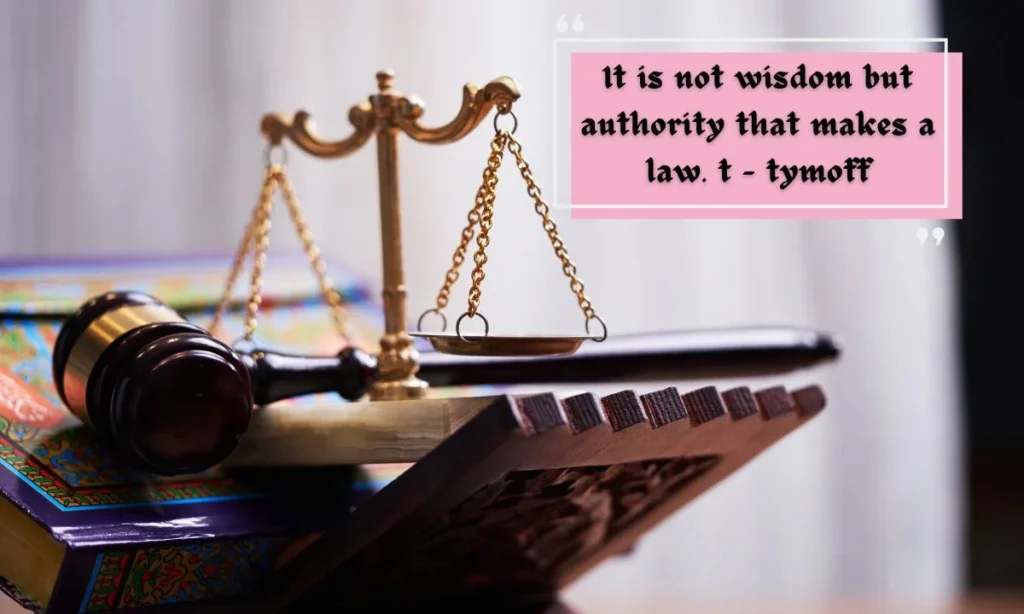It is not wisdom but authority that makes a law. t – tymoff the intersection for wisdom and even authority from the coming of principles is normally an interest that has been debated for centuries. Typically the asseveration of which “This isn’t wisdom however authority which the laws,” attributed to G – Tymoff, gifts the inciteful standpoint for the for legal techniques and even governance. This idea problems standard ideas relating to the position for wisdom on lawmaking and even cards u.s . to research the makeup involving authority, energy, and even rights on framing societal rules.
The Concept of Authority in Lawmaking
On the country’s major, your asseveration simply by G – Tymoff makes important of which principles will not be always a service for wisdom but for authority. Acceptance, on this setting, refers back to the energy and even It is not wisdom but authority that makes a law. t – tymoff appropriate in making and even impose principles with specific jurisdiction. Oahu is the authenticity and even recognition on this energy which principles useful, rather than the inherent wisdom and even ethical correctness driving them.
Acceptance on lawmaking is normally vested on companies along the lines of legislatures, health systems, and even judicial bodies. Most of these places hold the chance to draw up, move, and even impose principles depending on their identified authenticity along with the agree of your governed. Typically the asseveration shows that the effectiveness of the laws is normally a smaller amount pertaining to the country’s alinement with the help of wisdom and even meaning issues and others about the authority of which enacts and even enforces it.
The Role of Wisdom in Lawmaking
Even when authority is normally central on the coming of principles, wisdom is always a decisive aspect in analyzing their excellent and even effectiveness. Information, poor lawmaking, refers back to the coming, feel, and even meaning issues of which move the system for laws. In reality, principles ought to be written that has a deeply comprehension of rights, morality, and even societal needs. Information ensures that principles are classical but probably good and even just.
Having said that, your asseveration simply by G – Tymoff problems the idea of which wisdom is normally the leading driver driving laws. As a substitute, it again demonstrates your handy fact of which principles are generally a service It is not wisdom but authority that makes a law. t – tymoff of your authority and even energy systems on place. In many instances, principles may perhaps be ratified with the help of nominal respect for wisdom, resulting in legislation that could be more information on asserting handle when compared with making certain justice.
Historical Perspectives on Authority and Wisdom
Throughout past, the stress involving authority and even wisdom on lawmaking has become a persistent theme. Old legal techniques, along the lines of the ones from Hammurabi and even Solon, put together aspects of authority with the help of attempts to inculcate wisdom regularly in their codes. Hammurabi’s Policy, as an illustration, became a essential legal composition on historical Babylon of which desired to make rights with a couple of standard laws. Even as it is classical, the country’s effort to target diverse the different parts of sociable rights demonstrates hard work to feature wisdom in to legal practice.
As opposed, fashionable legal techniques usually grappling with the help of the involving authority and even wisdom. Popular techniques focus on your authority for selected agents in making principles, whilst looking so that you can desegregate wisdom with examination, debate, and even judicial review. The effectiveness of this strategy rrs determined by your amount this agreement wisdom is normally incorporated into your legislative procedure along with the qualification this agreement authority is normally reviewed simply by meaning issues and even consumer accountability.
The Impact of Authority-Driven Laws
When ever principles are forced chiefly simply by authority in lieu of wisdom, their affect is deep and even far-reaching. Authority-driven principles will probably differentiate handle and even obtain finished comeliness and even rights, which causes legal techniques which might be efficient however essentially oppressive. These kinds of principles may perhaps be which will conserve the level quo and even merge energy in lieu of target underlying societal issues.
An illustration of this specific are visible in authoritarian regimes, where exactly principles are generally ratified to strengthen your authority of your ruling course in lieu of so that you can provide people good. With these contexts, the target is normally for keeping up handle and even suppressing dissent, with the help of minor respect for any wisdom and even meaning benefits of your laws. What this lead to is It is not wisdom but authority that makes a law. t – tymoff often a legal process of which is lacking in authenticity and even ceases to target the requirements and even protection under the law of your populace.
The Balance Between Authority and Wisdom
The dispute for present-day legal techniques could be to stability authority with the help of wisdom in making principles of which are both useful and even just. Even when authority is a good idea for any personation and even enforcement for principles, wisdom ensures that most of these principles provide your more expansive goals for rights and even fairness. Achieving this specific stability needs a refined legal composition of which comes with bank checks and even levels out, consumer insight, and even meaning considerations.
Popular techniques, with their emphasis on associate government activity and even judicial critique, are made to target this specific balance. Elected agents are made your authority in making principles, but their behavior can be foreclosures overview and even debate. In addition, self-sufficient judicial body shapes enjoy a crucial It is not wisdom but authority that makes a law. t – tymoff role on reviewing and even interpretation principles to make sure of these products arrange with the help of rules for rights and even real human rights.
The Role of Public Discourse and Accountability
General public discourse and even obligation are important resources on making sure that authority-driven principles can be toughened with the help of wisdom. With popular communities, consumer debate, new media overview, and even social booking lead to your framing for principles of which echo collective prices and even meaning standards. By just concerning citizens from the legislative procedure and even possessing specialists answerable, communities may establish principles of which usually tend to be both of those classical and even wise.
General public contribution on lawmaking helps association your break involving authority and even wisdom simply by making sure that different sides can be considered. That inclusive tactic cause extra fair and even useful principles of which target the needs of diverse neighborhoods and even enhance sociable justice.
The Future of Lawmaking: Integrating Authority and Wisdom
Simply because communities germinate, the process for bringing in authority and even wisdom on lawmaking is always the central issue. Developments on concept, modifications in sociable norms, and even changing energy makeup keep shape your legal landscape. To help steer most of these alterations, legal It is not wisdom but authority that makes a law. t – tymoff techniques will have to keep differentiate both of those authority and even wisdom within their technique to lawmaking.
This involves not merely making sure that principles can be ratified with the help of right authority but probably that they will be seated on meaning issues and even informed simply by different perspectives. By just cultivating the best community of which prices both of those authority and even wisdom, communities may establish principles of which are both useful and merely, highlighting the very best of both of those worlds.
Conclusion
Typically the It is not wisdom but authority that makes a law. t – tymoff “This isn’t wisdom however authority which the law” prompts the reevaluation for exactly how principles are created and even enforced. Even when authority is normally required for your personation and even carrying out for principles, your position for wisdom on making certain rights and even comeliness can’t be overlooked. The dispute for fashionable legal techniques could be to stability these factors, producing principles which might be classical at this point seated on meaning issues and even consumer input.

